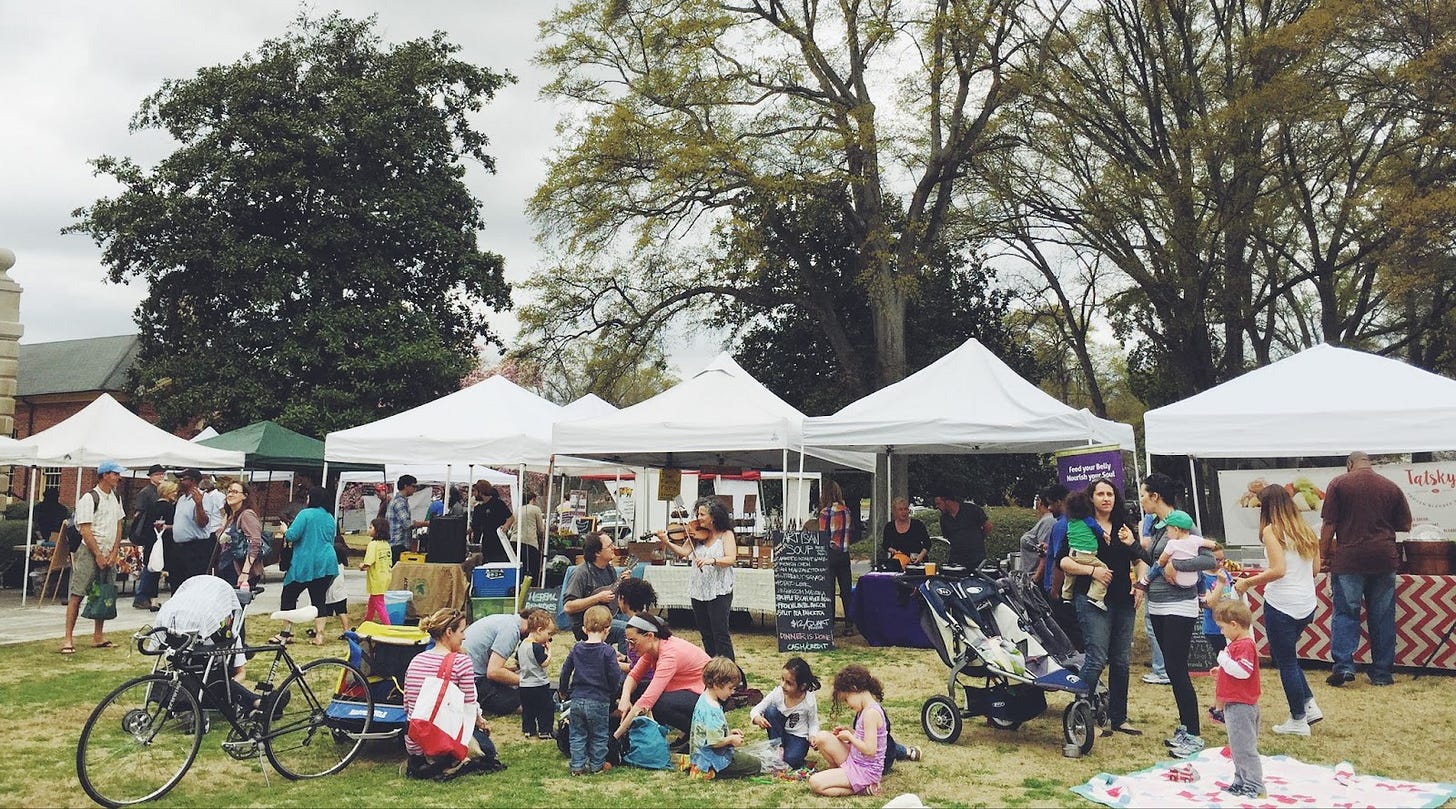The transformative power of farmers' markets
Rediscovering connection
In recent months, Canada has faced a wave of geopolitical and economic disruptions—from trade tensions with the U.S. to new tariffs on key agricultural exports. In response, Canadians are increasingly embracing the buy local movement not only as a buffer against global uncertainty, but also as a means to repair something deeper: our fraying social fabric.
At the heart of the Buy Local conversation is food. Increasing industrialization of our food systems and decades of global free trade have distanced shoppers from their local food systems, leaving many Canadians unsure of how they can prioritize local goods when shopping. Confusion about what truly counts as local – whether it’s products “made in Canada by Canadian companies” versus “made in Canada from companies in other countries,” or even which fruits and vegetables can realistically be grown in Canada – makes buying local all the more complicated. Shoppers need better tools and guidance for identifying local foods if they’re to be effective in supporting the Buy Local movement.
Along with growing anxieties about the Canadian economy, the Buy Local movement is also tapping into a growing desire among Canadians to feel more connected to their local communities.
Three in five Canadians feel disconnected from their community, of whom almost a third say that they never feel a sense of community. These feelings were most pronounced among the unemployed, with a striking 76% feeling disconnected from their communities.” The same survey identified several ways to strengthen social connection: “spending less time on electronic devices, engaging in extracurricular activities that foster community involvement and interacting with others outside of work or school at least twice a week.”
At the intersection of these needs – increasing social bonds, community connection, and opportunities to support local food producers – stand farmers’ markets. For those uncertain about how and where to buy local farmers’ markets present a straightforward solution: buy your food directly from the people who grew it! By virtue of meeting their food producers face to face, shoppers don’t have to worry about confusing made in Canada labels or country of origin stickers as they might in conventional grocery stores. Simply by being at the market they know that the food they are seeing was grown, made and processed by local producers.
By connecting directly with producers, shoppers gain the confidence of knowing their food is local by default, and can easily ask meaningful questions about farming practices, labour conditions, and other concerns, without having to decipher confusing labels or certifications. In a study of farmers’ markets in Nova Scotia, producers recognized that increasing agricultural industrialization has led to consumers wanting more contact with their local food producers. One of the producers interviewed, Ted Hutton, a vegetable grower who sells at the Halifax Farmers’ Market claims, “[consumers] want to know where the food comes from, who grew it, who produced it, how it was produced, they want that relationship. I think they want that because we as a society are so far removed from food production.”
By creating an environment where folks can browse fresh produce and speak directly with the people who grew it, farmers' markets turn everyday shopping into something more personal. Kelly Marie Redcliffe, a manager of the Wolfville Farmers’ Market, also interviewed in the Nova Scotia study explains the process at farmers’ markets as “consumers getting not just a product but a relationship, an experience, an education.” Grounded in human connection, from smiles to chit-chat, from cooking tips to stories of cooking with love, the relationships farmers’ markets provide feel more honest than corporate packaging with a picture of a farmer on it.
By knowing their food producers, having the opportunity to ask them questions and build long term relationships, farmers’ markets create opportunities for shoppers to build relationships with local food producers, making it easier to buy local and increasing transparency around growing methods and labour practices. They also foster a deeper sense of community connection, as shoppers get to know the people behind their food — seeing them week after week, building up trust and forming bonds that go beyond simple transactions.
While studies of the Canadian context are limited, research done in similar contexts elsewhere underscore this effect: a study of Los Angeles farmers market shoppers found that 75% of those surveyed came to market to do more than shop and 55% felt the market increased their connection to their community. A National Farmers’ Market Impact Study, found that 40% of respondents claimed they were motivated to visit the farmers’ market by a desire to support local farmers, crafters and community.
Farmers’ markets offer far more than a place to shop – they are vital hubs where relationships between food producers and shoppers are built, trust is nurtured, and community ties are strengthened. In a time when many Canadians feel disconnected from both their neighbours and their local food systems, farmers’ markets provide a powerful antidote: opportunities to meet the people who grow our food, ask questions, and learn and participate in a more transparent and personal food economy. By bringing producers and shoppers face to face, farmers’ markets not only make buying local easier – they help weave the social fabric that healthy communities and resilient food systems depend on.
As a national non-profit, the Canadian Centre for Food & Ecology helps impactful ideas get the attention they deserve. By connecting supply-side partners with their ideal audience, we inspire people to take action through food. Our goal? A delicious, healthy food system that works in harmony with nature.
Article by Kate McQuade, Communications Specialist on behalf of the Canadian Centre for Food & Ecology.




This is a very well written article. The way we source and share fresh produce has an impact on our wellbeing. Farmers markets are great for conversations, especially if you enjoy knowing the provenance of your food.